Whether it’s a B2C or B2B website, one of the common challenges for marketers is to rank higher on search result pages for relevant keywords or queries that prospects search for. The higher your website ranks, the more visibility your brand gains and thus more traffic and sales.
Now, you’re not alone in wanting your site to rank higher for relevant keywords – there are your known competitors in the industry and maybe thousands of other websites competing for the exact keywords you want to rank for.
So, how can you win your desired position on search results? There are tons of SEO strategies that you can leverage to boost your website ranking.
However, Link building is one of the most effective SEO strategies that B2B marketers can implement to rank higher and drive more traffic to the website.
In this blog, I will share some of the proven link-building strategies that you can use to grow your website. Before that, let me first tell you what Link building is and why it is essential for B2B marketing.
What is Link building?
Do you know that Google considers multiple ranking factors to rank a page on search result pages?
Well, there are hundreds of ranking factors that search engines use in the ranking, and some of the ranking factors are as follows –
- Backlinks
- Content Freshness
- Page speed
- HTTPS
- Mobile-friendliness
- User experience
- Content accuracy
Among all, backlinks are arguably the most critical ranking factor for Google, i.e., the more links to your website from relevant and authoritative sites, the higher your page will rank.
Now, the process of getting more and more quality backlinks from other websites to your own is what we call Link-building, and Link building strategies enable you to track and attract high-quality inbound links to your websites.
Advantages of Link-building in B2B Marketing
In B2B, link-building is not just a means to acquire new links to your website but also to build authority and establish brand credibility in the space.
Here are a few benefits of link-building for B2B brands –
- Domain Authority building – When your site gets backlinks from websites with a higher Domain Authority score than yours, it improves the domain authority for your site as well. The higher the domain authority, the higher you’ll rank for competitive keywords.
- Referral Traffic sources – If done strategically, link building can help you gain a lot of referral traffic from established websites in your space which can be very useful in your lead generation strategy.
- Faster Google Indexing – Once you have established a good domain authority for your website, Google will see your site as valuable and crawl more frequently, resulting in fast page indexing.
7 Most Effective B2B Link-building Tactics
There are many ways to get backlinks, but the options are pretty limited for getting relevant and quality backlinks to a B2B website. Going further, I will show you the 7 most effective link-building strategies for B2B marketing.
If you’re ready, let’s get started.
1. Guest Blogging
There’s a big reason why I put guest blogging on top of the list – it creates the most impact on building authority and brand visibility. With guest blogging, you don’t just get backlinks but the opportunity to share your ideas and opinions among an already established audience base which helps you attract new eyeballs to your brand.
So, how to find guest blogging opportunities?
Step 1: Make a list of authority blogs in your niche.
First, you need to list out all the blogs in your space where you want to submit guest blogs. To create a list of such blogs, you can do a simple Google search with a keyword phrase you want to target and add the high authority websites to the list.
Or you can use Semrush Keyword Magic Tool to find the most relevant websites quickly. You just have to enter your main keyword in the search bar and hit the search button. Then, scroll down to see the list of all the keywords related to your searched term.
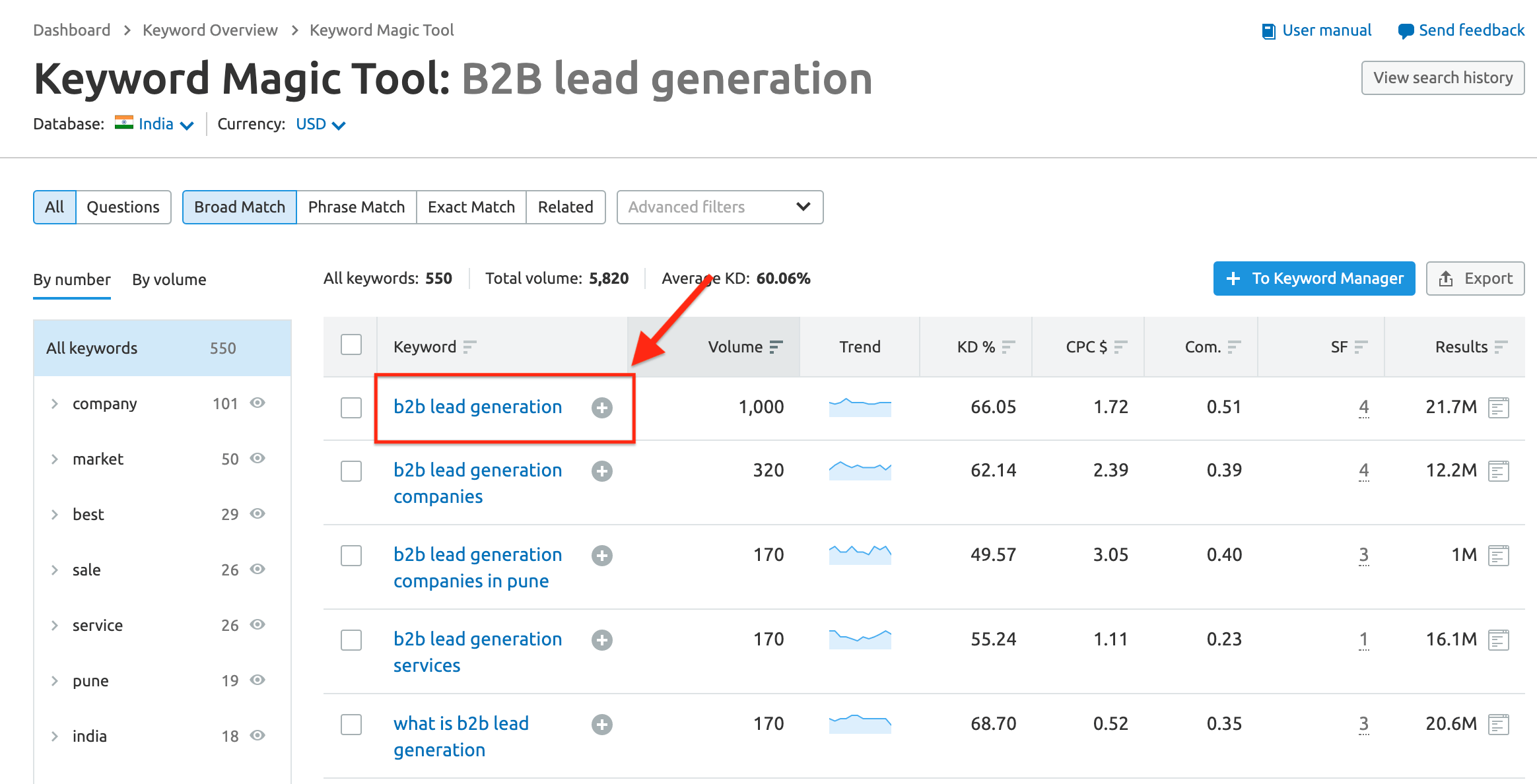
Now click on one of the keywords to find the list of web pages ranking for that specific keyword on Google search results. Export the list of URLs and add it to your Google Sheets.
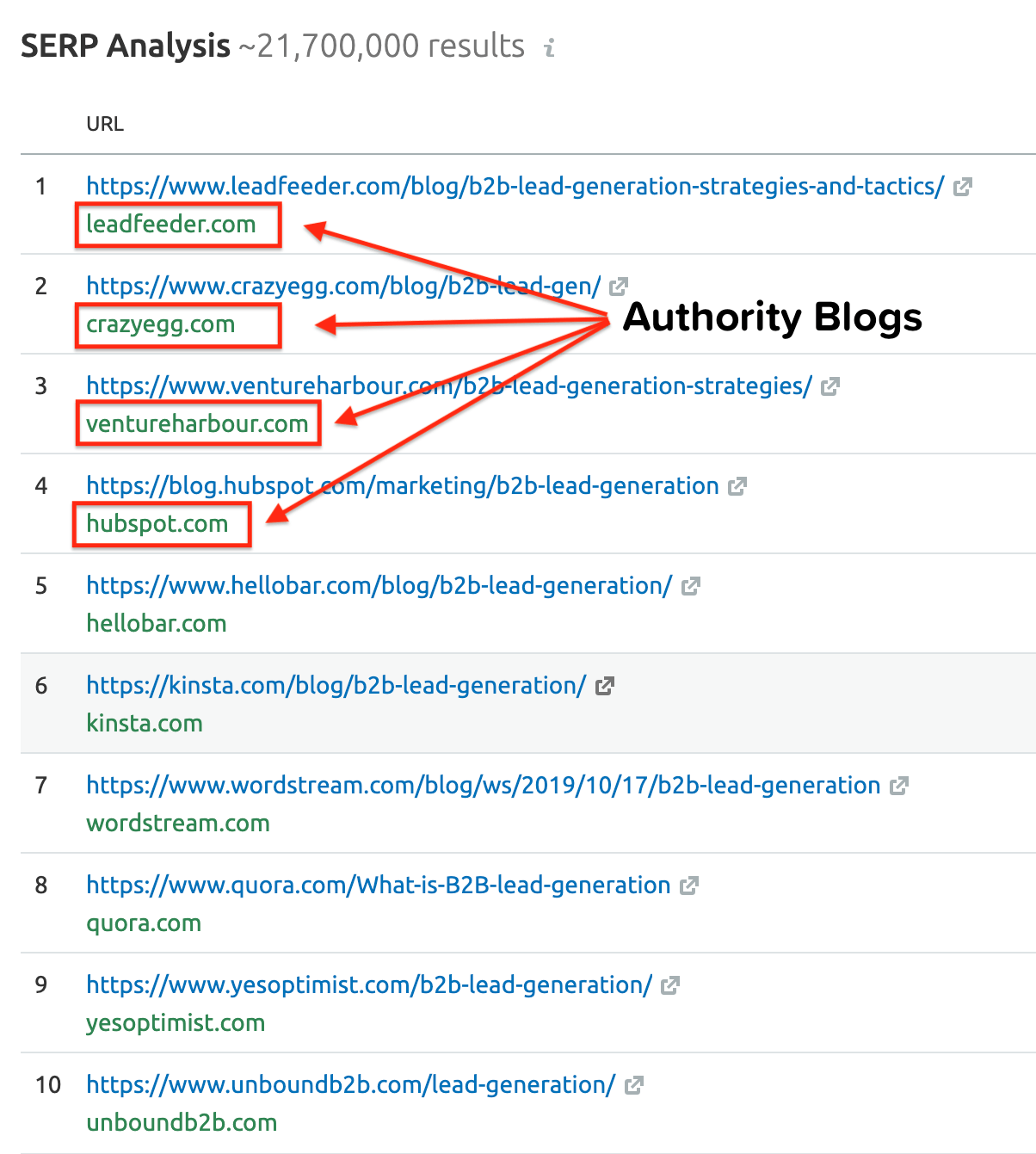
Step 2: Determine if the sites in your list accept guest blogs.
Now you need to find how many of the blogs from your list accept guest posts. To determine this, you should start by visiting these sites and looking for pages like “Write For Us” or “Guest Posting.”
Usually, you will find the links to such pages in the footer or secondary menu of the site. You can also try the internal Search box to see if any page or article related to guest blogging exists on that website.
If this idea sounds complicated, you can use the following search queries to determine if the site accepts guest blogs –
- site:domain.com “submit a guest post”
- site:domain.com “contribute an article”
- site:domain.com “write for us”
- site:domain.com “submit your post”
- site:domain.com “become a contributor”
- site:domain.com “guest post”
For example, if you want to publish a guest blog on Inc42, you can use one of the above search queries, and this is how you’ll see the result.
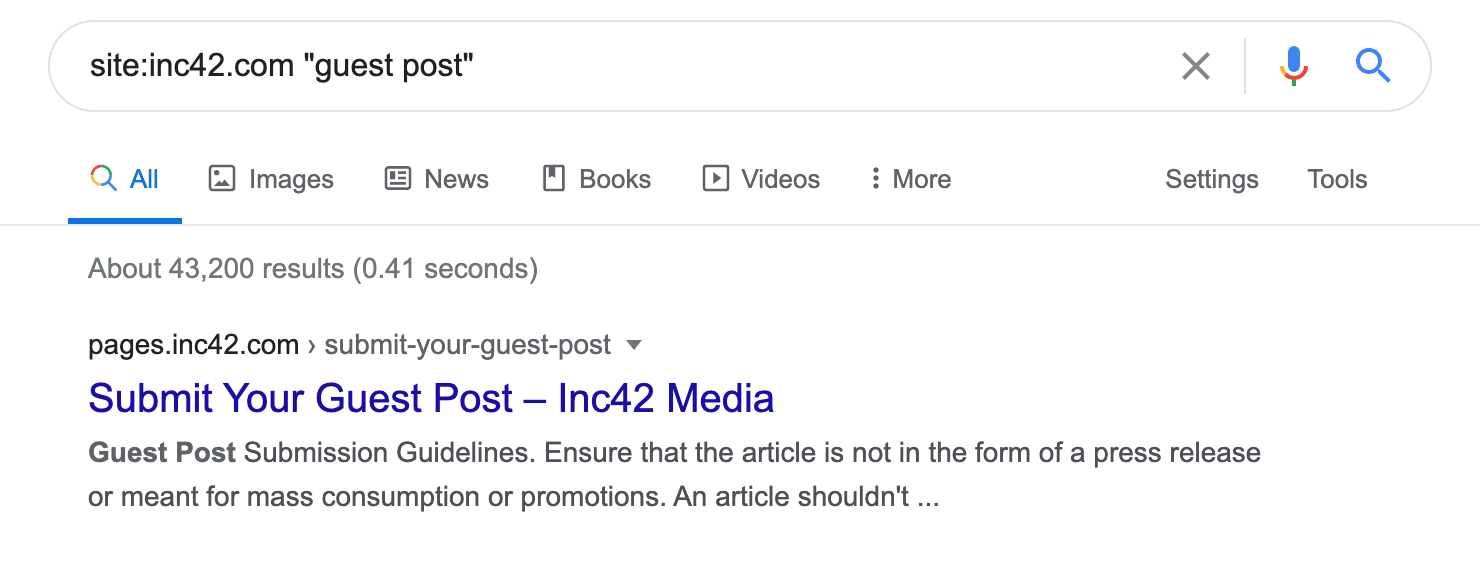
However, if you see the result of your queries like this (image below) for a specific site, the blog most likely doesn’t accept guest blogs.

Step 3: Access the blogs.
You don’t want to do all the hard work to get backlinks from a website that doesn’t benefit your website’s SEO. This is why, once you have determined the sites available for guest blogging, access the blogs to see if it is worth your time.
- Check if their Domain Authority is higher than your website. Backlinks only from more top domain authority sites benefit your website SEO.
- Check if they provide a “do follow” attribute to outbound links. If not, just remove the site from your list.
- Check the sharing counts on blog posts. If social sharing is good, the readers find the site credible and engage actively.
Now, you will have a shorter list of the highest quality websites in your niche where you can submit guest blogs.
Step 4: Prepare your pitch, write, and submit your article.
Without any delay, go through some of their recent blog posts and figure out the topic for the article you would like to submit there.
Now, prepare your pitch to publish your guest blog and start reaching out to the website owner/admins with your ideas once you get the approval, write your article and submit it as soon as possible.
2. Broken Link Building
It is a tactic in which you discover the broken backlinks on another website from where you want backlinks to your website and reach out to the site owner or manager with an alternative link to replace the broken links. That alternate link can be one of your pages.
This strategy is all about establishing a relationship with other website owners, content writers, and bloggers from your niche and exchanging links and other resources to help each other grow.
So, how to build broken links?
Step 1: Create a list of target websites
To create a list of websites you want backlinks from, you can start with a simple Google search with your keyword phrases and list out all the top-ranking websites manually, or you can use SEMrush as described in the previous sections.
Step 2: Analyse the websites
Now analyze the websites thoroughly to find broken links. For this, you can use the “Check My Links” Google Chrome extension, which highlights all the broken links on a webpage. However, going through each site page can be overwhelming and tiring.
This is where you can use Ahref Broken Link Checker to find all the broken links on a site as shown below and export them.
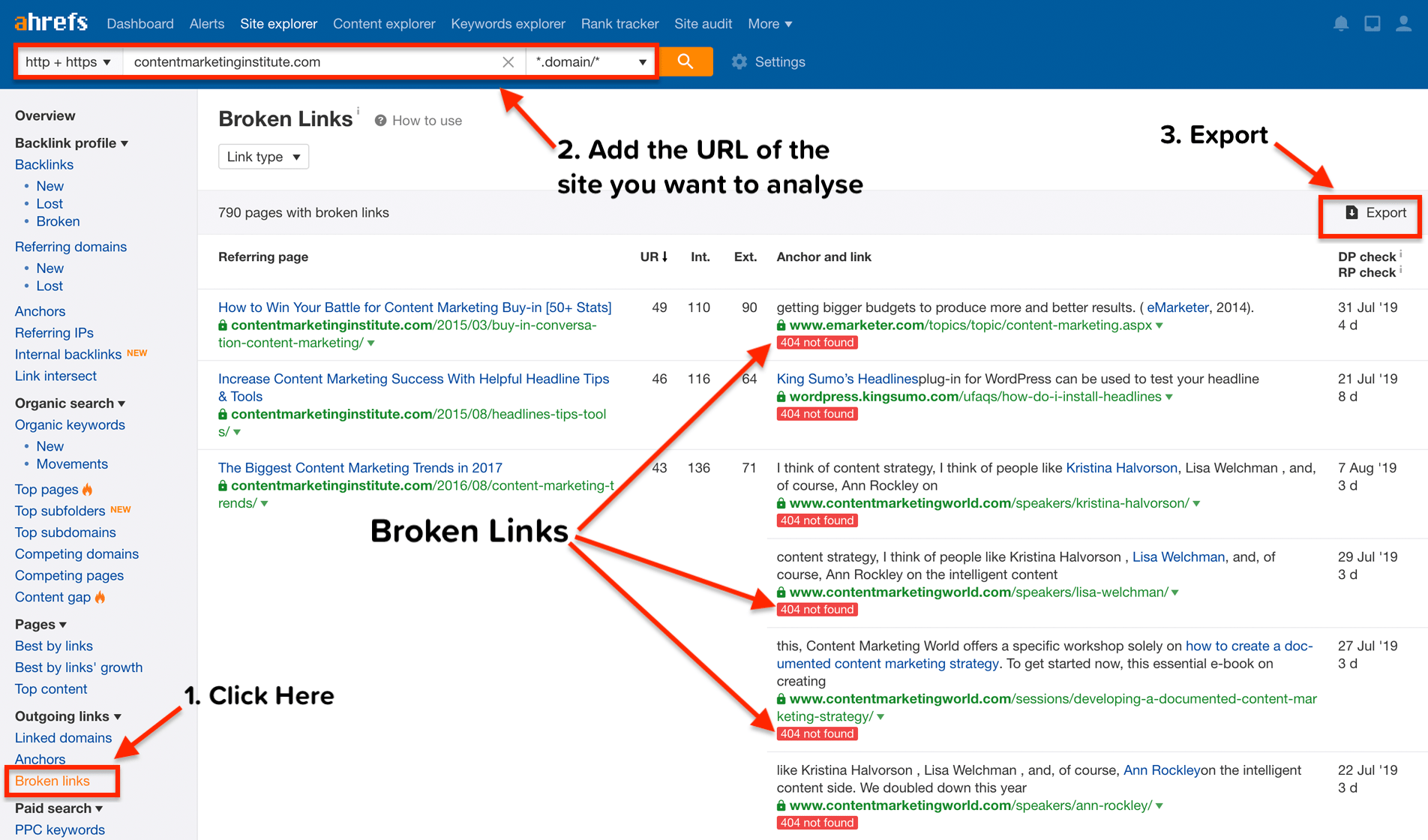
Now, you have a list of all the broken links on the website. Analyze the list and see if you can offer alternative links to replace those broken links from your website.
Step 3: Reach out to the blog owner/manager
Based on your assessment, start reaching out to the website owner or managers to notify them about the broken links on their site and suggest alternative links to your site to replace them.
3. Replicate competitors’ Best Backlinks
If your competitors are ranking higher than you on search result pages, it means that they must be doing something better than you. You can replicate it too.
So, how can you replicate your competitors’ link-building strategy?
Step 1: Identify your major competitors
You might already know all your competitors in your region (with whom you are competing in a specific locality, country, or state). Still, when it comes to ranking on Google, you need to compete with global players in your niche.
You can use the SEMrush keyword research tool to identify all the web pages ranking higher for the keywords you want to rank for. Go to semrush.com and enter your keyword. Then, hit the search button.
Now, you will see a list of all the web pages ranking for that keyword on Google search results. Export the report and add it to your Excel sheet.
Step 2: Assess the backlinks of those websites
Once you have identified your major competitors, you need to analyze their backlink profiles. Click on the Backlink Analytics tab under the SEO Toolkit, add a link from your list in the search bar, and hit the button.
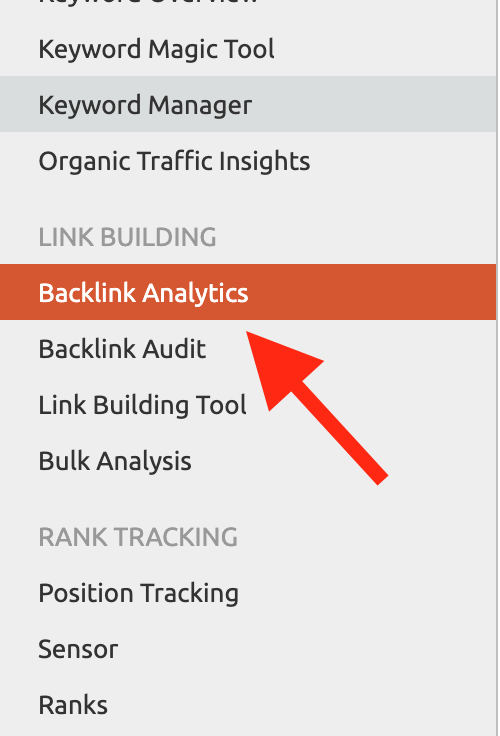
Next, scroll down and see all the backlinks to that site (not the page). In the below image, you can see that I have checked the “New” option because I wanted to identify my competitor’s most recent backlink sources.
Similarly, you can add link type, No. of links per referring domain, and other advanced filters to narrow down the list for better analysis.
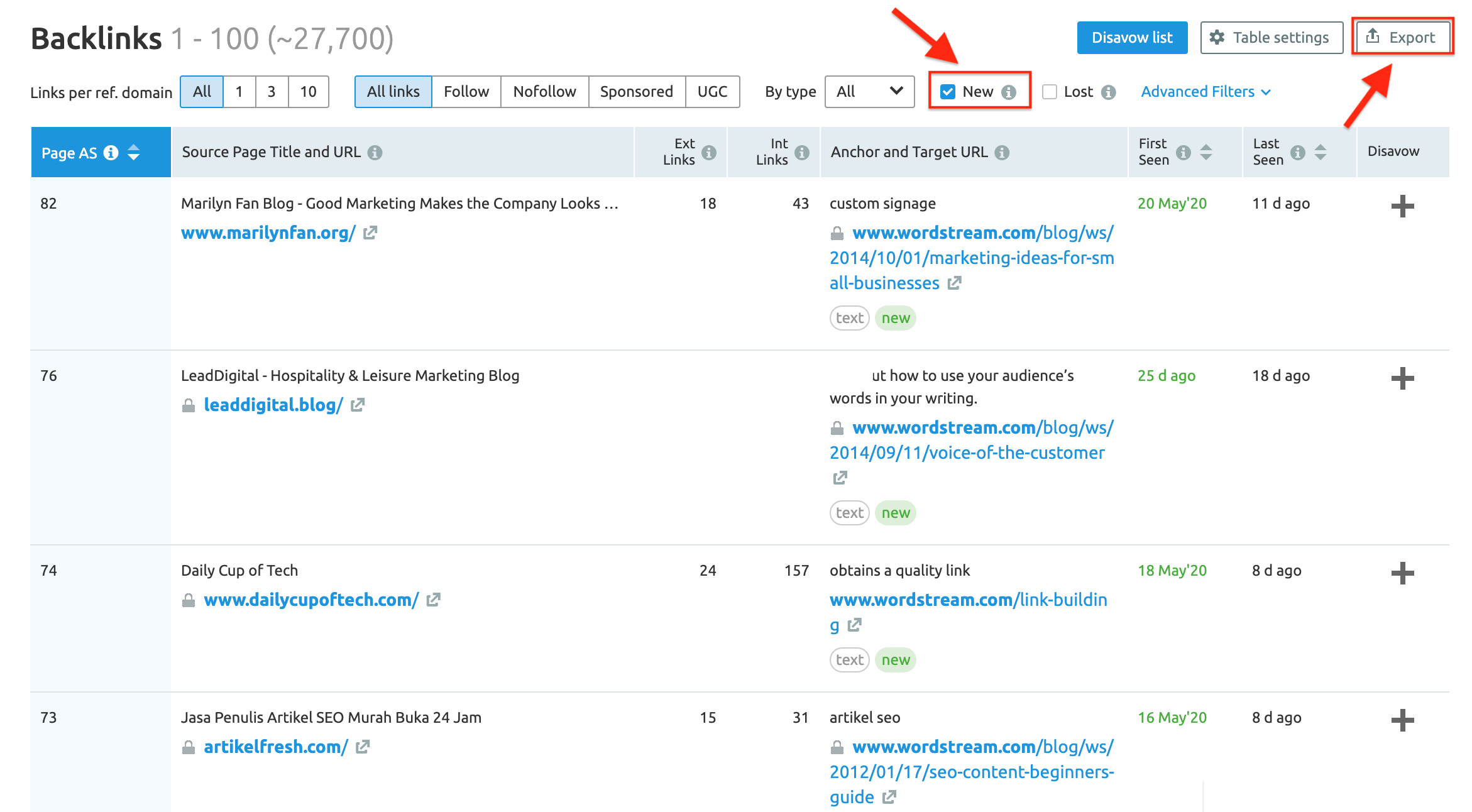
Now export the list of backlink source URLs and add it to your Google sheet. Then, analyze it to figure out why did they get those backlinks.
For example, if you see that the site has gained a lot of backlinks from industry blogs, then it means that your competitor is well-respected in the industry, and the columnists love to mention the brand name in their articles. Similarly, if you see that they have gained most of their backlinks from newspapers and magazines, then your competitors must have invested in PR or sponsored articles.
By analyzing these links, you will gain many insights into your competitors’ marketing strategies, and you can reverse engineer them for your business.
4. Get Interviewed on podcasts
Podcasts have been growing massively in the last couple of years, and there will be over a million podcasts by the end of the year. I’m sure the number is growing every day.
So, how does getting interviewed on a podcast can help you in link-building? The answer lies in the podcast you choose to be interviewed on.
Many popular podcasts have websites where they publish articles or transcriptions of each podcast episode with the guest introduction. And that’s where you have the opportunity to get a backlink to your site.
Now, how to find the relevant podcasts to be featured on?
Step 1: Create a list of podcasts from your niche
When picking up the podcast to be featured on, you must choose the podcasts related to your niche and, most importantly, those podcasts to which your target audience is listening.
The best way to list such podcasts is to search for the keyword phrase related to your business on Apple Podcast (You can use other podcast directories like Spotify, Stitcher, or Google Podcast) and add the names of the top shows in your list of the target podcasts.
For example, I am a B2B marketer, and I want to get interviewed on podcasts related to it. So, I searched for “B2B marketing” on Apple Podcast.
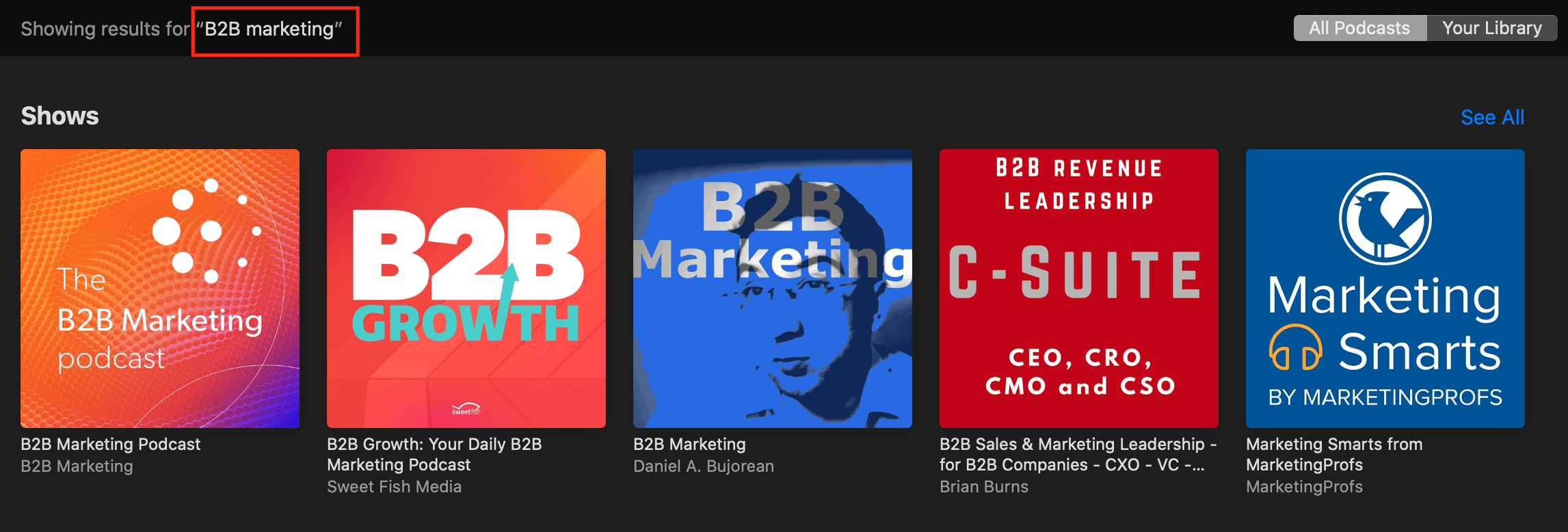
Here you’ll see the top-ranking podcasts, and it may be tough to get a spot on most of these podcasts. So, you’ll need first to find easy targets for which to click on one of these podcasts and scroll down to view more podcasts under the “You Might Also Like” section.

Now, add all the podcasts you find relevant and want to be featured on your list.
Step 2: Find out how many of these podcasts have a website
Once you have a list of all the podcasts you want to be featured on, find out how many of them have their website. To find out, you need to search the podcast name on Google and see if any website comes up.
For example, when I searched for a B2B Growth Podcast, their official website appeared on the result page. Visit the site and see if they add backlinks to the guest. “The B2B growth show” is quite generous in this aspect.
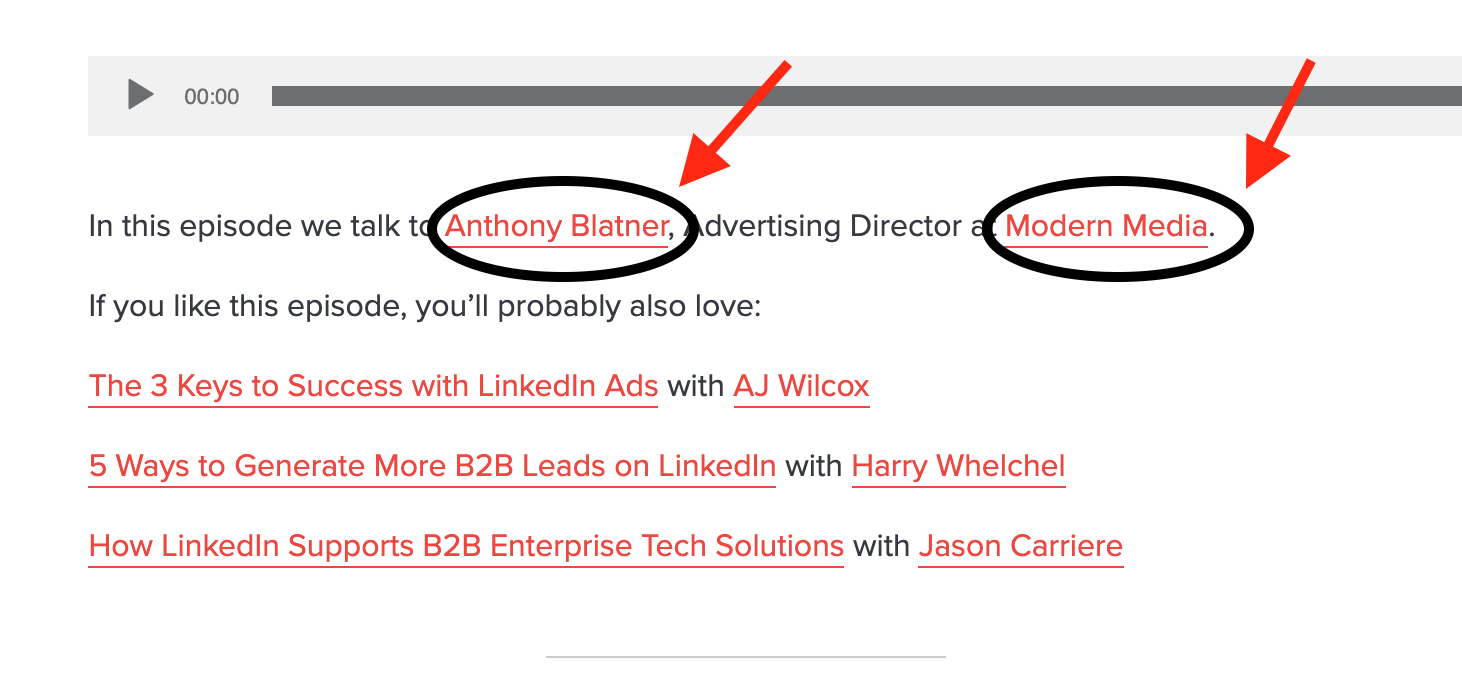
If no such website appears, remove the podcast from your list.
Step 3: Compare the Domain Authority of websites
Now, you have the podcasts in your list from your niche, and you should try to get featured on the podcast. However, if you are doing this only to get quality backlinks to your website, you need to compare the domain authority of these websites and sort list the sites with DA scores higher than your website.
You can use Moz Link Explorer to check the domain authority of these websites, as shown below.

Step 4: Start reaching out to hosts
Finally, look through the website, LinkedIn, Instagram, or any other medium to get in touch with the podcast host and pitch your idea and how you can bring value to the podcast by being a guest.
This is the most challenging part of all to convince someone to allow you to interact with his/her audience. So, try to establish a relationship with the host and show what you have for his/her audience.
5. Create & Submit Infographics
Infographics can play a crucial role in your link-building strategy. Designing a compelling infographic can cost a lot to a business in terms of money and time. This can be one of the possible reasons you might not see infographics on most of the websites you listed in earlier sections.
This is where you can come into the picture by offering them a quality infographic based on one of their popular blog posts or something new related to your niche, and in return, you can exchange for backlinks to your website.
Since creating an infographic can cost you time and money, you can use this strategy to pitch the websites that don’t allow guest posts but are mighty in your industry.
6. Add your company to Business-listing websites
Business listing websites list are online listing places to promote companies or enterprises to the outside markets. These are the spots for your customers to learn about your business and compare other vendors for their requirements.
The profile on these sites is public, and a typical listing site contains your company’s name, email, website, address, and contact number. Most Business Listing websites add no-follow tags to the website link, but still, the backlinks from these platforms can be beneficial if their Domain Authority is high and is popular in your niche.
Also, B2B customers use business listing websites for their research purposes to learn about your company and other vendors before signing up for the deal. Thus, it is helpful for link-building and can be vital for B2B customer journey mapping.
7. Claim links for your brand mentions
If your brand is a thought leader in the industry, many columnists, bloggers, partners, and competitors may mention your brand name in their articles. However, in many cases, the author forgets to add a link to your brand name so that readers can visit your website.
In such cases, you can reach out to the author or the website manager and ask them if they can link back to your website. To make sure you come to know about your brand mentions, you need to monitor the web constantly.
You can use Buzzsumo or Google Alerts to monitor your brand name on the web. Google Alerts is a free tool but is limited in features. However, it is an excellent tool to start with if operating on a low budget.
On Google Alerts, you need to create an alert with your brand name, and it will keep you notified via email as soon as someone mentions your brand name on another website.
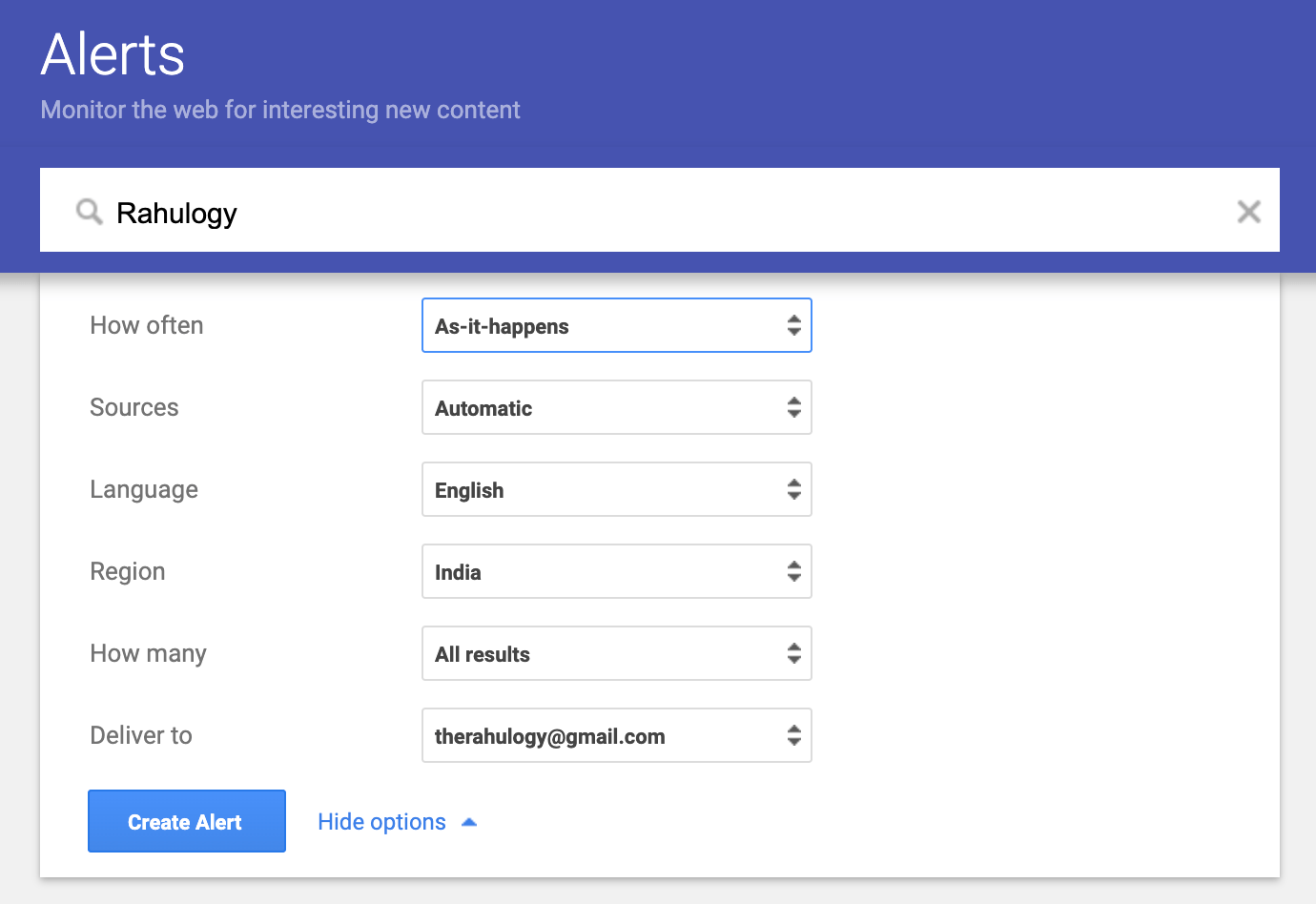
Once you get a brand alert, assess the website to see if they have added a link to your site or not. If not, compare their Domain Authority Score with yours and if you find the website relevant for link building, reach out to the writer or someone who manages the site to fix the issue.
Wrapping Up
You know the best 7 B2B link-building strategies that you can quickly implement in your SEO strategy. However, if you have a small team or work on a low marketing budget, I recommend you not try all the strategies at once.
Instead, pick any 2 to 3 of these strategies, implement them effectively, and set the process in motion before applying another. No matter how easy these strategies sound, you will need to spend time and effort to ensure that the strategy works.
I hope that this article helped with the link-building strategy for your website. You should also check out our comprehensive B2B keyword research guide to discover the right keywords for your business and drive quality traffic.
